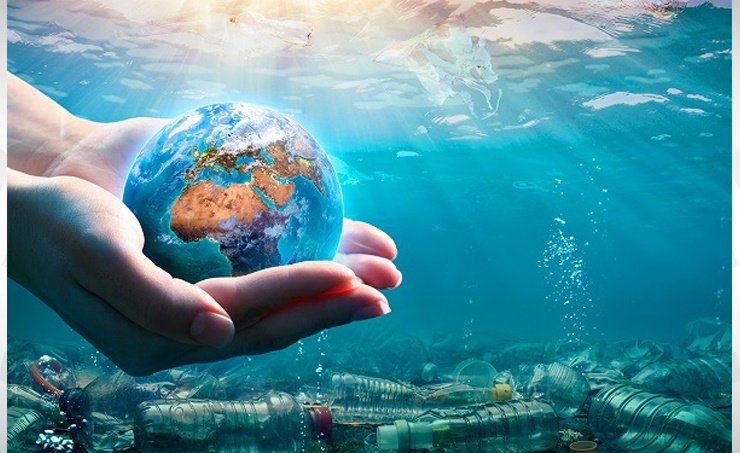The oceans are one of the largest and deepest bodies of water on the planet. They cover over 70% of the Earth’s surface and host a tremendous variety of marine life. In this article, we will explore the significance of the oceans and their environmental role.
The oceans are a primary source of oxygen on the planet. Marine organisms undergo the process of marine respiration, which releases oxygen into the air. When algae and marine plants respire in the ocean, oxygen is produced and distributed throughout the planet.
Additionally, the oceans serve as a source of renewable energy through wind, ocean currents, and waves that can be harnessed for electricity generation.
The oceans also harbor a vast diversity of marine life. They are home to diverse marine organisms such as fish, coral reefs, whales, turtles, worms, crustaceans, and many other species. This marine life forms a complex food web that supports the sustainability of living organisms and plays a vital role in the balance of the ecosystem.
Furthermore, the oceans regulate the global climate. They absorb vast amounts of carbon dioxide from the atmosphere and help reduce its concentration in the atmosphere, thereby mitigating the effects of greenhouse gas emissions and climate change. Additionally, the oceans regulate the Earth’s temperature and distribute heat around the planet through ocean currents and winds.
However, the oceans face significant environmental challenges. They are subjected to marine pollution due to industrial and agricultural runoff, as well as plastic waste. This leads to negative impacts on marine life and the marine environment. Additionally, coral reefs are facing degradation due to climate change and water pollution.
These challenges require global cooperation to protect the oceans and preserve marine biodiversity. To protect the oceans, we must adopt sustainable practices in the use of marine resources and reduce marine pollution. We need to raise public awareness about the importance of the oceans and encourage participation in their protection. We can also establish marine protected areas and enforce strict environmental laws and policies to preserve the oceans and regulate marine fishing.

oceans and their environmental importance::
- Climate Regulation: The oceans play a crucial role in regulating climate patterns on Earth. They absorb and store a significant amount of heat, helping to stabilize global temperatures. Ocean currents, such as the Gulf Stream, distribute heat energy around the planet, influencing weather patterns and climate systems.
- Carbon Sink: The oceans act as a massive carbon sink, absorbing about 30% of the carbon dioxide released into the atmosphere from human activities. This absorption helps mitigate the impacts of greenhouse gas emissions and reduces the rate of global warming. However, excessive carbon dioxide absorption can lead to ocean acidification, which negatively affects marine life and ecosystems.
- Biodiversity Hotspots: The oceans are home to a vast array of species, many of which are found nowhere else on Earth. Coral reefs, for example, are known as the “rainforests of the sea” due to their incredible biodiversity and ecological significance. Protecting these biodiversity hotspots is crucial for preserving marine life and maintaining the balance of ecosystems.
- Economic Importance: The oceans have immense economic value. They support numerous industries such as fishing, shipping, tourism, and offshore energy production. The fishing industry, in particular, provides a source of livelihood for millions of people worldwide. Sustainable management of marine resources is essential to ensure the long-term viability of these industries.
- Oxygen Production: As mentioned earlier, the oceans are a significant source of oxygen production through photosynthesis by marine plants and algae. They contribute approximately 50-80% of the oxygen in the Earth’s atmosphere, making them vital for the survival of terrestrial and marine organisms.
- Climate Change Mitigation: The oceans play a critical role in mitigating climate change by absorbing and storing large amounts of heat and carbon dioxide. However, climate change itself poses a threat to the oceans. Rising sea temperatures, melting polar ice caps, and sea-level rise are some of the consequences of climate change that impact marine ecosystems and coastal communities.
- Ecosystem Services: The oceans provide a wide range of ecosystem services that benefit humans. They regulate weather patterns, provide habitat for marine species, protect coastlines from erosion, and offer recreational opportunities such as swimming, surfing, and diving. Preserving these ecosystem services is essential for our well-being and the health of the planet.
It is crucial to recognize the interconnectedness of the oceans with other ecosystems on Earth. Their health and conservation are not only important for marine life but also for the overall health and sustainability of our planet. Efforts to protect and preserve the oceans should be prioritized through conservation measures, sustainable practices, and international collaboration.
